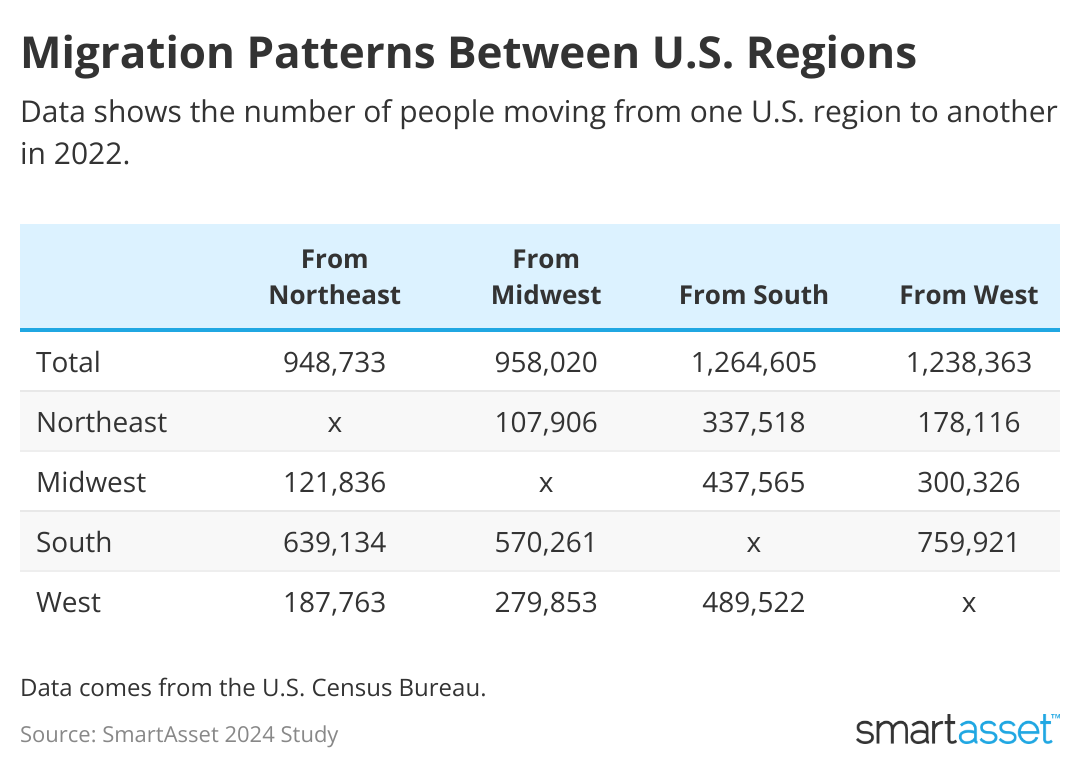Which regions in the US have the most people moving in?

University of College // Shutterstock
Which regions in the US have the most people moving in?
moving truck driving on road
Many factors can drive people to move to and from the four major U.S. regions. From remote work enabling greater mobility to changes in industry, cost of living, taxes, new legislation, and beyond. A big-picture understanding of the patterns behind what region people are moving to can reveal how it affects infrastructure, voting trends, employment, and other aspects of those regions.
With this in mind, SmartAsset examined trends behind where people are moving in the Northeast, South, West, and Midwest, using the latest Census Bureau data.
![]()

SmartAsset
Key findings
table showing populations and changes in NE, MW, W, S regions of U.S
- People moved out of the Northeast more than any other region. While nearly 624,000 people moved to the Northeast, another 949,000 moved out for other regions for a net loss of 325,000. In both cases, movers predominantly came from or moved to the South. The Northeast also had both the highest rate of people staying put (89.3% did not move in 2022) and the lowest migration rate within the same region (about 8.9%). The Northeast is the smallest region by population, with roughly 56 million people.
- The South gained the most people from each other region. Almost 2 million moved into the South, with the majority coming from the West (almost 760,000), another 639,000 from the Northeast and just over 570,000 from the Midwest. Though, roughly 1.26 million Southerners left for other regions at the same time. Most went to the West (489,522), while 437,565 went to the Midwest and 337,518 moved to the Northeast. The South also saw 11% of its population – more than any other region – move within its borders in the past year. Overall, the South has the largest population of any region (approximately 127 million people).
- The Midwest lost a net of nearly 100,000 to other regions. While nearly 860,000 people from the Northeast (122,000), South (438,000) and West (300,000) moved into the Midwest, another 958,000 Midwesterners moved out of the region. The Midwest is the third-largest region by population, with a total of 68 million people.
- The West is the second-most popular region. While the West lost a net 283,000 to other regions, it also had the second-highest influx of people (957,000). Those movers came from the Northeast (188,000), South (489,000), and Midwest (280,000). At the same time, 1.24 million people left the West, with more than half flocking to the South. With roughly 78 million people in total, the West is the second-largest U.S. region by population.
- More than 40% of migrants from abroad moved to the South. Out of about 2.14 million foreigners who migrated to major U.S. regions from abroad, almost 904,000 moved to the South. Relative to their respective populations, this move-in rate was nearly identical to that of the Northeast, which gained 397,000 from abroad. The West saw the migration from abroad at just over 534,000 people, while the Midwest had the smallest relative and absolute inflow at 306,000 people.
Data
The latest 1-Year American Community Survey U.S. Census data for calendar year 2022 was examined for the four major U.S. regions: Northeast, South, Midwest, and West.
This story was produced by SmartAsset and reviewed and distributed by Stacker Media.